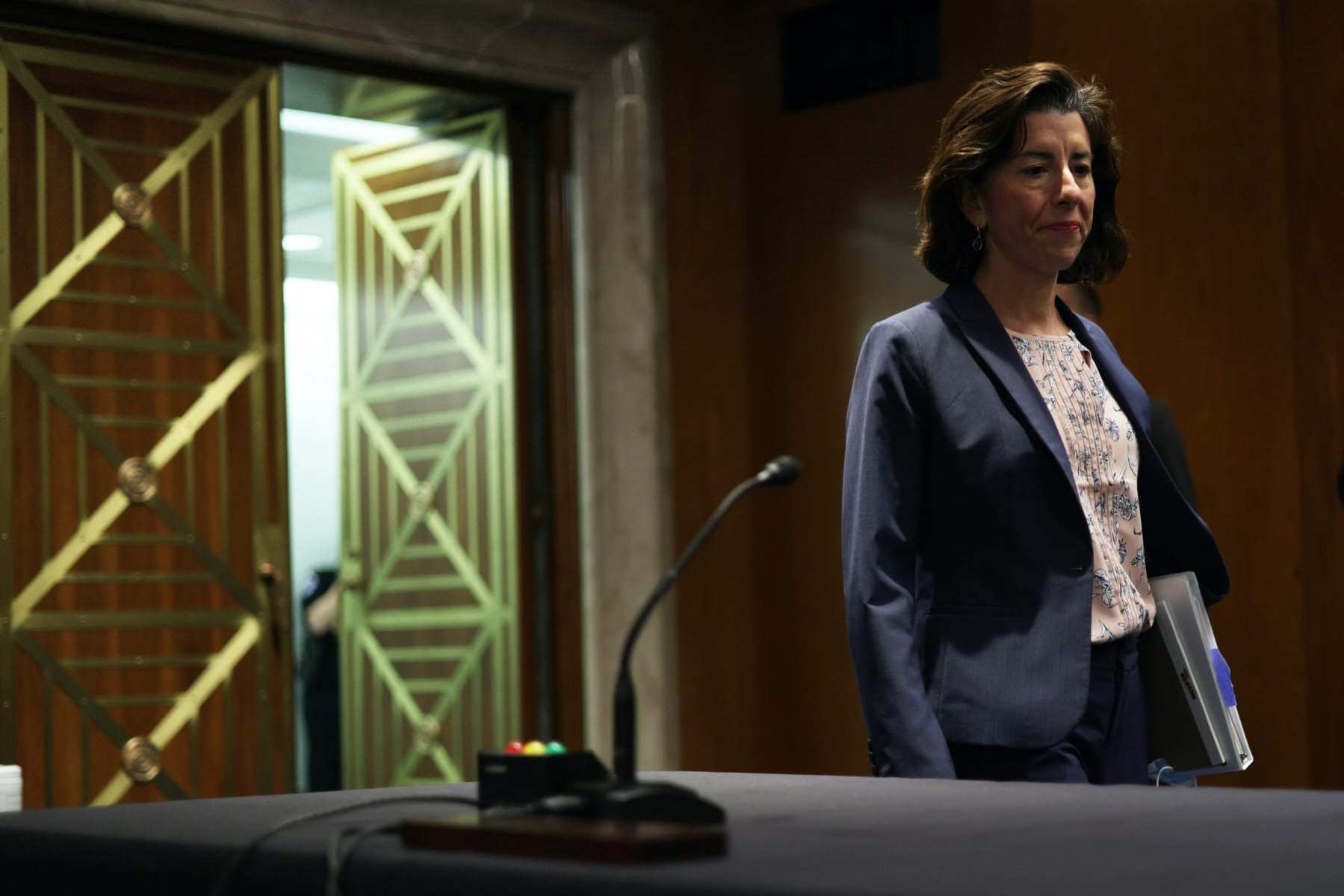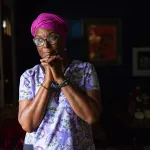Commerce Secretary Gina Raimondo has said that she couldn’t have reached her current position or become the first woman to serve as governor of Rhode Island without the help of care workers.
Her two children have been attended by a care worker for 15 years. Raimondo’s 90-year-old mother also has a care team of women who she relies on.
“Like so many women, I have depended on other women in my life in order to care for my loved ones,” she said at a summit in April.
In Rhode Island, Raimondo increased wages for child care workers. The issue is so central to her, it was part of the reason she wanted the job as Commerce secretary. She wanted to fight for the care economy investments President Joe Biden included in his American Jobs Plan, Raimondo previously told The 19th.
That $2 trillion package called for $400 billion to expand Medicaid payments to home and community health, helping address a severe funding issue while also raising minimum wages for home care workers — a workforce that is almost all women, predominantly women of color — to $15 an hour.
As the negotiations over the plan intensified in the past few weeks, Biden tapped Raimondo, a moderate Democrat with ties to Wall Street, and four other Cabinet secretaries — Transportation Secretary Pete Buttigieg, Housing and Urban Development Secretary Marcia Fudge, Energy Secretary Jennifer Granholm and Labor Secretary Marty Walsh — to help reach a bipartisan deal.
They did — but it left out the care infrastructure plan that helped bring Raimondo to the administration in the first place.
Now, Raimondo is eyeing the president’s American Families Plan as the potential next opportunity to support working families and the care workforce.
The Biden administration is already having conversations about the Families plan, which includes universal pre-K, universal paid leave and a $225 billion investment in child care, and which it hopes to pass concurrently with the Jobs plan through a political vehicle known as reconciliation. That would allow it to pass with 50 Democratic votes, plus Vice President Kamala Harris as the tie-breaker, in the evenly split Senate. Typically, bills require 60 votes.
But a timeline on getting something through a narrowly divided Congress is not yet clear.
The 19th spoke to Raimondo about her involvement in both packages and the work she is doing to get them passed.
This interview has been edited for length and clarity.
Chabeli Carrazana: As part of the president’s “Jobs Cabinet,” you were very involved in the bipartisan infrastructure plan negotiations. What role did you play in those conversations, and how did you help lawmakers reach a deal?
Gina Raimondo: I met with dozens of senators and members of the House at all levels and in both parties. Mostly answering the questions: questions around the substance of the package, how we will implement it — particularly the broadband, which Commerce would be very involved with. I think it’s been for me, as a newcomer to Washington — really encouraging because everybody’s been acting in good faith on both sides of the aisle, digging into the details, working hard, focused on the substance. The president has been very involved himself. And I think there is a recognition among people that it’s good for America if we can have our government work resolving problems across the aisle.
Do you think that coming in as a bit of an outsider helped you navigate those conversations? What do you think that you were able to contribute to get this to the finish line?
I don’t know if being an outsider has been helpful. I think that being a governor has been helpful. I have a long track record in working collaboratively with legislative bodies, and you have to do that — you have to put in the time.
They are an equal and independent branch of government. They have really important questions. And they represent their constituents and their communities, and it’s just super important that they are listened to and heard and respected. I did that as governor and so I take that approach to this job.
The American Jobs Plan specifically omits the “care infrastructure” piece and what would have been a historic investment in home care — a field that is 90 percent women. You mentioned when you were with us last that you took this job in part to fight for that. How are you continuing that fight now and what specific conversations are you having to ensure support for care infrastructure has a place in later packages?
The fight continues. It is not in the bipartisan infrastructure package, because we were not able to secure, frankly, bipartisan support for it. I hope that every bit of it, every penny of the $400 billion is in the [Families plan] reconciliation package. I [was] talking over this [past] weekend to members of the House and the Senate, just underscoring the importance of this.
In order for women to be able to get back into the workforce, they need to know that their loved ones are being cared for at home. In order for people to age with dignity, they need high-quality, well-paid care workers. And for the millions of women who work in the care economy in really important, really hard jobs, they deserve job security, job training and decent wages. And so we are going to stay at this until we get something passed.
When the support wasn’t there for the care infrastructure piece in the bipartisan plan, how did you decide: I’m going to set a path for myself as to what I’m going to be able to contribute here to try to get this to be included in the next one. What did you set forth for yourself?
I did this in Rhode Island. We set up a home care infrastructure, we made an effort to unionize the folks that do this work and push for higher wages. I saw it work. I saw the health care system become less expensive because fewer people had to go into nursing homes, which are very, very expensive. And I saw the women who are working in the care economy getting the wages and benefits they deserve.
So, I know it can work. I know it’s the right thing to do. I know it’s good for our economy. And I just decided, like I told you before, it’s part of the reason I took the job.
We’re gonna fight for it until it happens. If It’s not in one bill, we’re gonna fight for it in the next bill. It has to happen.
So, let’s talk about that next bill. As we’re looking at a potential reconciliation pathway for the Families plan, I know a lot of those conversations are actually happening concurrently. But, considering it contains many of the other provisions that would benefit women workers, how, specifically, are you helping to get that one finalized, and what’s the temperature of those conversations at this point?
As the president said, he wants these bills to happen in tandem — the reconciliation bill in tandem with the bipartisan bill. So it’s happening now, the sausage making that is the legislative process is playing out as we speak. We are spending our time educating members of the legislature about how important it is.
I wanted to ask you about something outside of these packages. In Rhode Island you worked on a small-business loan program that specifically benefited a number of women and people of color. As Commerce secretary, are you doing anything in the short term to help those groups? Is there anything you’re working on that you can tell us about?
We are working on putting out grants through the MBDA, which is a part of Commerce — the Minority Business Development Agency — which are grants exclusively to smaller minority-owned businesses. We are in the throes of finalizing this stuff.
We saw programs that were set up during the pandemic — like the [Paycheck Protection Program] — that were supposed to help small businesses but really failed to meet those metrics, and so changes were made. I’m curious how you’re thinking about implementation on upcoming programs like this. Are you building in anything that would address the existing disparities for women and people of color and LGBTQ+ folks who might struggle to be able to access programs like that?
Barriers to access, it’s a real issue. The key thing is transparency and tracking and holding ourselves accountable. In this regard, during the pandemic, as governor, I launched an initiative called Back to Work Rhode Island, which was an effort to help people who had lost their jobs, mostly in services industries in COVID, to get retrained and placed in new jobs. And when I launched the program, I told everyone publicly: We want half or more to go to women. We want 20 percent or more to go to people of color, and we are going to really lean into this and we put a dashboard online and we tracked it.
And in the end, 62 percent were women, over 25 percent were people of color. And I think that’s the way I plan to do all of this, which is to set goals, make the data public, be very transparent and hold ourselves accountable.
You have to make it happen. There are these barriers to access. There are communities which are harder to reach. Well that is true, so that means you have to work harder, be more creative.
We don’t want to hear excuses. We want to see results.







